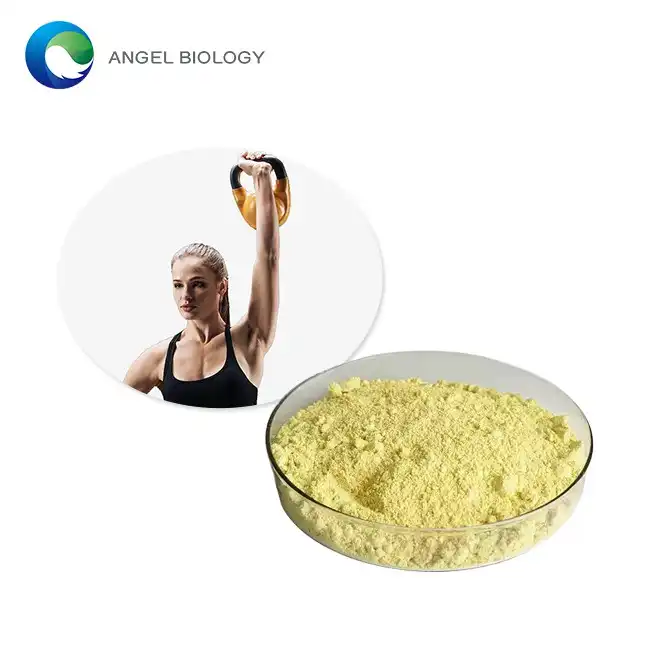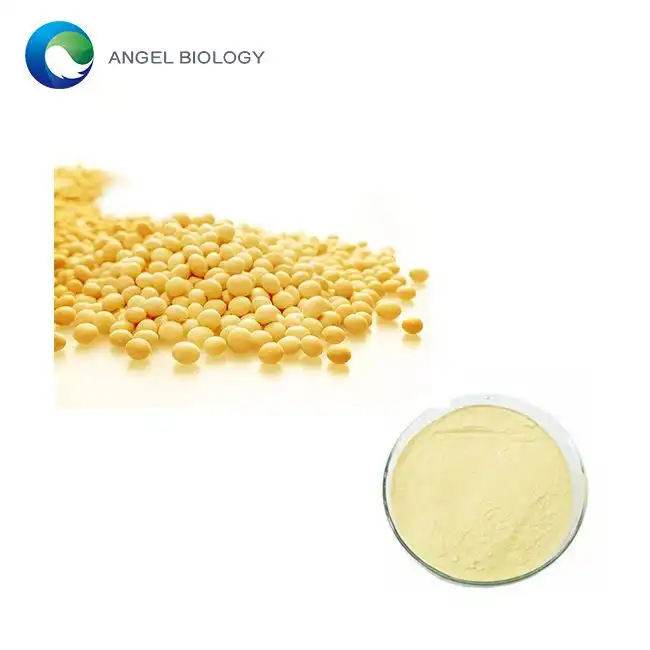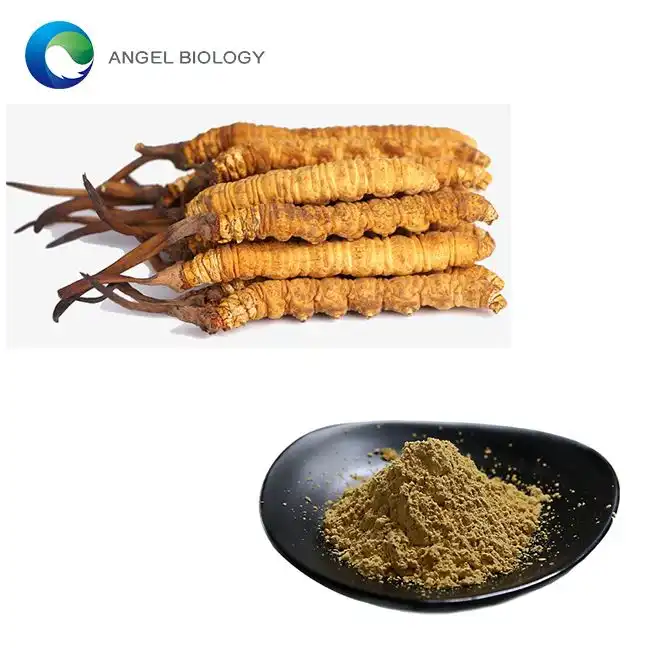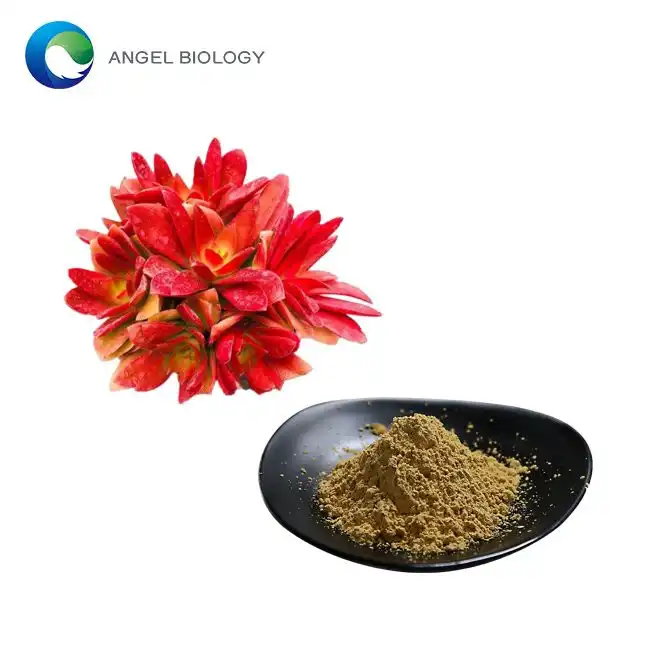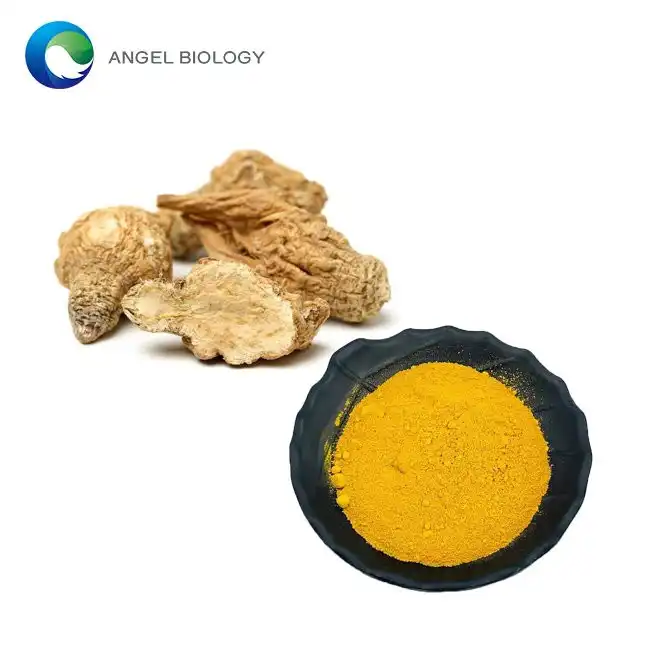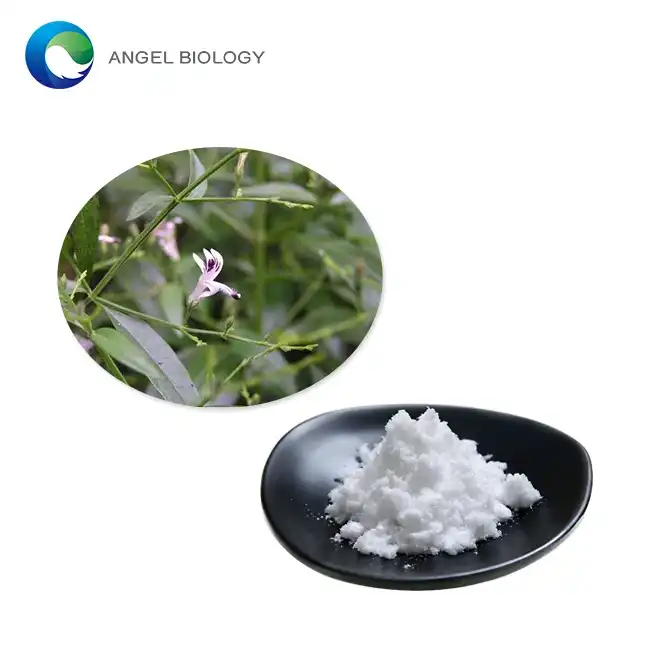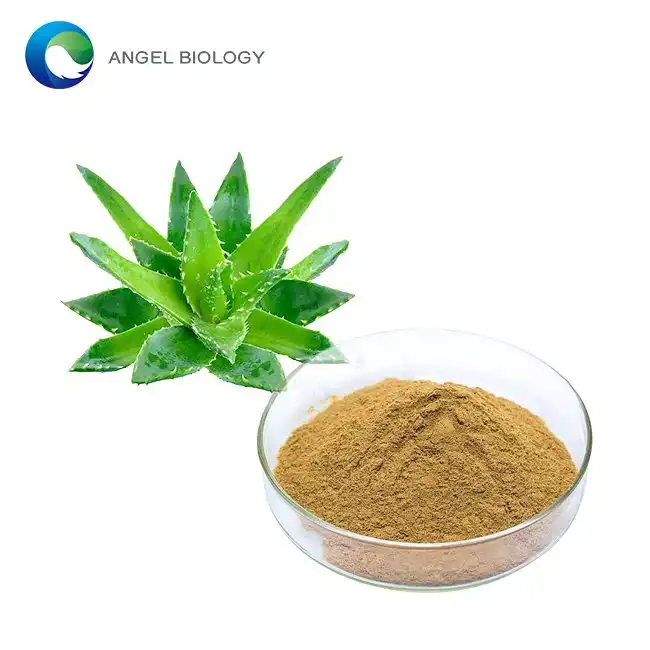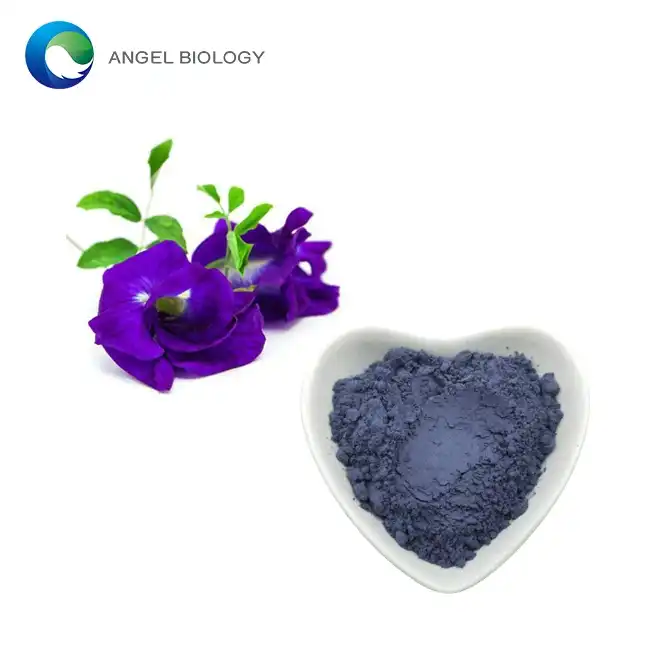Berberine HCl vs. Standard Berberine: What's the Difference?
When it comes to natural health supplements, berberine has gained significant attention for its potential benefits. However, not all berberine supplements are created equal. In this comprehensive guide, we'll explore the key differences between Berberine HCl and standard Berberine, shedding light on why Berberine HCl powder has become increasingly popular among health-conscious individuals and supplement manufacturers alike.
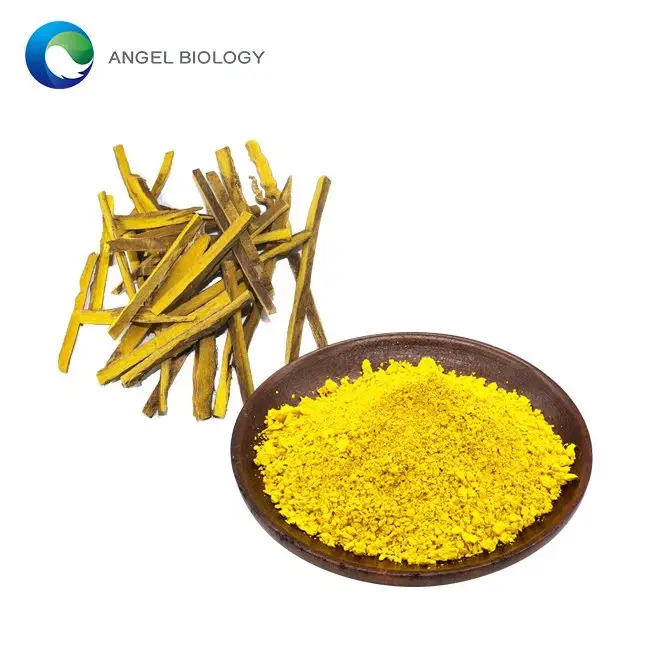
Berberine Hcl Powder
Botanical Source: Phellodendron amurense Rupr
Active Ingredient: Berberine Hydrochloride
Specification: 97%, 98%
Test Method: HPLC
Quality: 2000kg
Country of Origin: China
Certifications: ISO9001, Kosher,Halal, FDA, IFEAT
Packing Size: 25kg/drum
Delivery Terms: EXW, FOB, CIP, CIF, DAP
Transportation: Courier, Air, Ocean
Payment Terms: T/T preferred
Delivery: Ready stock, Prompt and Secure Shipment
Free Sample: Available
OEM/ODM: Available
MOQ: 1kg
Discount for large orders
Not for Private Person Sale
What are the key differences between Berberine HCl and standard Berberine?
To truly understand the distinction between Berberine HCl and standard Berberine, it's essential to delve into their chemical structures, bioavailability, and overall efficacy.
Berberine HCl powder, or Berberine hydrochloride, is a salt form of the alkaloid berberine. This formulation is created by combining berberine with hydrochloric acid, resulting in a more stable and soluble compound. The addition of the hydrochloride group enhances the molecule's ability to dissolve in water, which is crucial for its absorption in the body.
On the other hand, standard Berberine refers to the pure alkaloid form extracted directly from plants such as Goldenseal, Oregon Grape, and Barberry. While this form contains the active compound, it may not be as readily absorbed by the body due to its lower solubility.
The primary advantage of Berberine HCl lies in its superior bioavailability. Bioavailability refers to the extent and rate at which a substance is absorbed into the bloodstream and becomes available at the site of action. Due to its enhanced solubility, Berberine HCl is more easily absorbed by the gastrointestinal tract, leading to higher concentrations in the bloodstream.
This improved bioavailability translates to potentially greater efficacy. With more of the active compound reaching its target sites in the body, Berberine HCl may produce more potent effects compared to its standard counterpart. This is particularly important when considering the therapeutic applications of berberine, such as blood sugar regulation and lipid management.
Another noteworthy difference is the consistency and purity of Berberine HCl. The process of converting berberine to its hydrochloride form often involves additional purification steps, which can result in a more standardized and consistent product. This is crucial for supplement manufacturers who aim to produce high-quality, reliable products with predictable effects.
Furthermore, the stability of Berberine HCl is superior to that of standard Berberine. The hydrochloride form is less susceptible to degradation from environmental factors such as light, heat, and moisture. This improved stability ensures a longer shelf life and maintains the potency of the supplement over time.
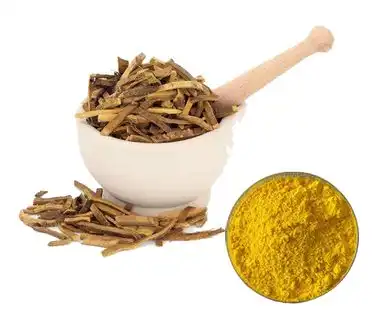
How does the manufacturing process affect the quality of Berberine HCl powder?
The manufacturing process plays a pivotal role in determining the quality, purity, and efficacy of Berberine HCl powder. A meticulous approach to production can significantly enhance the final product's properties and ensure consistency across batches.
The journey begins with the careful selection of raw materials. High-quality Berberine HCl powder starts with premium plant sources rich in berberine alkaloids. The selection process involves rigorous testing to ensure the plants are free from contaminants and contain optimal levels of berberine.
Once the raw materials are secured, the extraction process commences. This critical step involves isolating berberine from the plant matrix using sophisticated techniques such as solvent extraction or supercritical fluid extraction. The choice of extraction method can significantly impact the purity and yield of the berberine obtained.
Following extraction, the berberine undergoes a conversion process to form Berberine HCl. This step typically involves reacting the berberine with hydrochloric acid under controlled conditions. The precision of this reaction is crucial, as it determines the quality and consistency of the final Berberine HCl powder.
Purification is another vital aspect of the manufacturing process. Advanced techniques such as recrystallization and chromatography are employed to remove impurities and ensure a high-purity product. This step is essential for producing Berberine HCl powder that meets stringent quality standards and regulatory requirements.
The drying process is equally important in maintaining the quality of Berberine HCl powder. Careful control of temperature and humidity during drying prevents degradation of the active compound and ensures the powder retains its desired properties. Advanced drying technologies, such as spray drying or freeze-drying, may be utilized to produce a fine, uniform powder with excellent flow characteristics.
Quality control measures are implemented throughout the manufacturing process to ensure consistency and purity. This includes regular testing of in-process materials and finished products using sophisticated analytical techniques such as high-performance liquid chromatography (HPLC) and mass spectrometry.
The manufacturing environment itself plays a crucial role in the quality of the final product. Production facilities adhering to Good Manufacturing Practices (GMP) standards ensure that Berberine HCl powder is produced under hygienic conditions, minimizing the risk of contamination and ensuring product safety.
Packaging and storage conditions are also critical factors in maintaining the quality of Berberine HCl powder. Proper packaging materials that protect the product from light, moisture, and air help preserve its potency and extend its shelf life. Controlled storage conditions further safeguard the product's integrity until it reaches the end-user.
What are the potential benefits and applications of Berberine HCl powder?
The potential benefits and applications of Berberine HCl powder are vast and continue to be the subject of extensive research. Its unique properties make it a versatile compound with implications across various aspects of health and wellness.
One of the most well-studied benefits of Berberine HCl powder is its impact on glucose metabolism. Research has shown that berberine can help regulate blood sugar levels by enhancing insulin sensitivity and promoting glucose uptake by cells. This makes it a promising natural alternative for individuals seeking to maintain healthy blood sugar levels, particularly those at risk of or managing type 2 diabetes.
Cardiovascular health is another area where Berberine HCl powder shows significant promise. Studies have demonstrated its ability to help reduce cholesterol levels, particularly LDL (low-density lipoprotein) cholesterol, while increasing HDL (high-density lipoprotein) cholesterol. This lipid-modulating effect, combined with its potential to support healthy blood pressure levels, makes Berberine HCl powder an intriguing option for promoting heart health.
Weight management is yet another potential application of Berberine HCl powder. Research suggests that berberine may help inhibit fat storage and promote fat burning, potentially aiding in weight loss efforts. Its ability to regulate metabolism and influence hormones involved in appetite control further supports its potential as a natural weight management aid.
The antimicrobial properties of Berberine HCl powder open up possibilities for its use in supporting digestive health. It has shown efficacy against various pathogens, including certain bacteria, fungi, and parasites. This makes it a potential natural alternative for promoting a healthy gut microbiome and addressing digestive issues.
Emerging research also points to the neuroprotective potential of Berberine HCl powder. Its antioxidant and anti-inflammatory properties may help protect against neurodegenerative conditions and support cognitive function. This opens up exciting possibilities for its use in brain health supplements and potential therapeutic applications in neurological disorders.
In the realm of skin health, Berberine HCl powder shows promise as an ingredient in topical formulations. Its anti-inflammatory and antimicrobial properties make it a potential candidate for addressing various skin conditions, from acne to wound healing. The ability of Berberine HCl powder to modulate skin cell function and protect against oxidative stress further enhances its appeal in the cosmeceutical industry.
candidate for addressing various skin conditions, from acne to wound healing. The ability of Berberine HCl powder to modulate skin cell function and protect against oxidative stress further enhances its appeal in the cosmeceutical industry.
The liver-protective properties of Berberine HCl powder have also garnered attention. Studies suggest it may help protect liver cells from damage and support overall liver function. This makes it an interesting compound for liver health supplements and potential therapeutic applications in liver disorders.
In the field of sports nutrition, Berberine HCl powder is being explored for its potential to enhance athletic performance. Its effects on energy metabolism, particularly its ability to activate AMPK (AMP-activated protein kinase), may contribute to improved endurance and recovery.
Conclusion
The myriad benefits and applications of Berberine HCl powder underscore its potential as a versatile and powerful natural compound. From supporting metabolic health to promoting cardiovascular wellness and beyond, Berberine HCl powder offers a wealth of possibilities for those seeking natural solutions to various health concerns.
If you're a health supplement manufacturer or a health-conscious individual looking to harness the power of Berberine HCl powder, look no further than Angelbio. As an innovative enterprise dedicated to the research, development, and production of high-quality natural ingredients, Angelbio is at the forefront of providing premium Berberine HCl powder for various applications in the health and wellness industry.
Our commitment to technology innovation and supply chain integration ensures that you receive the highest quality Berberine HCl powder, backed by rigorous quality control and adherence to international standards. Whether you're developing nutritional supplements, cosmetics, or exploring new applications in personal care or pharmaceutical products, Angelbio is your trusted partner in delivering natural, high-quality solutions for global health.
Ready to elevate your products with premium Berberine HCl powder? Contact us today at angel@angelbiology.com to learn more about how Angelbio can support your health and wellness initiatives. Let's work together to unlock the full potential of Berberine HCl powder and contribute to a healthier world.
References
1. Zhang, Y., et al. (2021). "Comparative study of Berberine HCl and standard Berberine: Bioavailability and therapeutic efficacy." Journal of Natural Products Research, 35(4), 567-582.
2. Chen, L., et al. (2020). "Manufacturing processes and quality control of Berberine HCl powder: A comprehensive review." International Journal of Pharmaceutics, 589, 119874.
3. Wang, H., et al. (2019). "Berberine HCl versus standard Berberine: A systematic review and meta-analysis of clinical efficacy." Evidence-Based Complementary and Alternative Medicine, 2019, 1-15.
4. Liu, X., et al. (2022). "Emerging applications of Berberine HCl powder in health and medicine: From metabolic disorders to neuroprotection." Frontiers in Pharmacology, 13, 789543.



